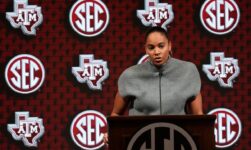The NCAA Board of Directors on Wednesday adopted several measures designed to assist with the mass influx of athletes entering the transfer portal while also modernizing its infractions process. Rubber stamped are new rules creating dedicated transfer windows for players to enter the portal, though the board officially shelved a proposal that would have allowed players to transfer unlimited times without penalty.
Separately, the board green lit three proposals submitted by the Transformation and Infractions Process designed to focus resources toward the most serious violations.
The transfer windows, which will go into effect in time for the 2022-23 season, will allow 60 days per year for athletes to enter the portal and maintain immediate eligibility for first-time transfers. For fall sports like football, the period will be split into two periods. The first, a 45-day period, will start the day after championship selections are made. A second window will be instituted from May 1-15 so players can enter the transfer portal after spring camp.
Spring sports, like basketball, would effectively have a reverse calendar; the first window lasting from Dec. 1-15 and the second being a 45-day window that starts the day after championship selections. For winter sports, the 60-day transfer window would be a continuous period that begins the day after championship selection.
The Division I Council endorsed proposed transfer periods in July but later reviewed a handful of issues relating to the legislation, including impact of name, image and likeness opportunities and academic questions.
“Like their peers in the general student population, college athletes choose to transfer for any number of reasons,” said Georgia president and board chair Jere Morehead in a statement. “We believe the changes enacted today enable member schools to adapt to students’ needs, while also positioning students for long-term academic success. These changes to NCAA rules recognize further study is needed on graduation rates before we consider authorizing multiple transfer opportunities with immediate eligibility. We will continue to review potential modifications to transfer rules as the landscape evolves over time.”
All athletes will be guaranteed financial aid at their next schools through completion of their eligibility or completion of an undergraduate degree. Extra consideration if a player either loses their head coach or has their scholarship adjusted.
While the unlimited transfer rule was declined, the board created a more flexible process for athletes to apply for immediate eligibility waivers outside of the one-time transfer rule with considerations given to athlete welfare and well-being.
The NCAA revealed in the spring that 950 undergraduate football players entered the transfer portal in 2021, up from 587 the previous year. A total of 54% of those players enrolled in another institution, 5% removed their names from the portal to return to their school and 41% were still in the portal at the time the report was released in April.
Many coaches have expressed frustration at the seemingly never-ending roster movement that has become commonplace since the portal was created. Utah quarterback Charlie Brewer, for example, entered the portal after three weeks as the Utes’ starter in order to retain eligibility. He later enrolled at Liberty, his third school in as many years.
More recently, former Bowling Green and West Virginia quarterback Jarret Doege transferred to Western Kentucky before spring camp. After losing the starting quarterback job at WKU, Doege entered the portal and transferred again to Troy just four days later as a graduate transfer.
Infractions process streamlined: The NCAA board also released new guidelines to “modernize” the infractions process and provide quicker resolutions to rule-breakers. Notably, the NCAA will get rid of the Independent Accountability Resolution Process, created in 2019, because of the number of cases referred to it slowing down the process. The five existing cases in the IARP will be resolved using that process, however.
New rules will also limit causes for appeals, increase the standard for overturning appeals and take arguments before the committee from oral to written form. Finally, the NCAA will limit instances of extending the timeline for decisions to “extreme and clearly defined circumstances.” These measures will take effect on Jan. 1, 2023.




